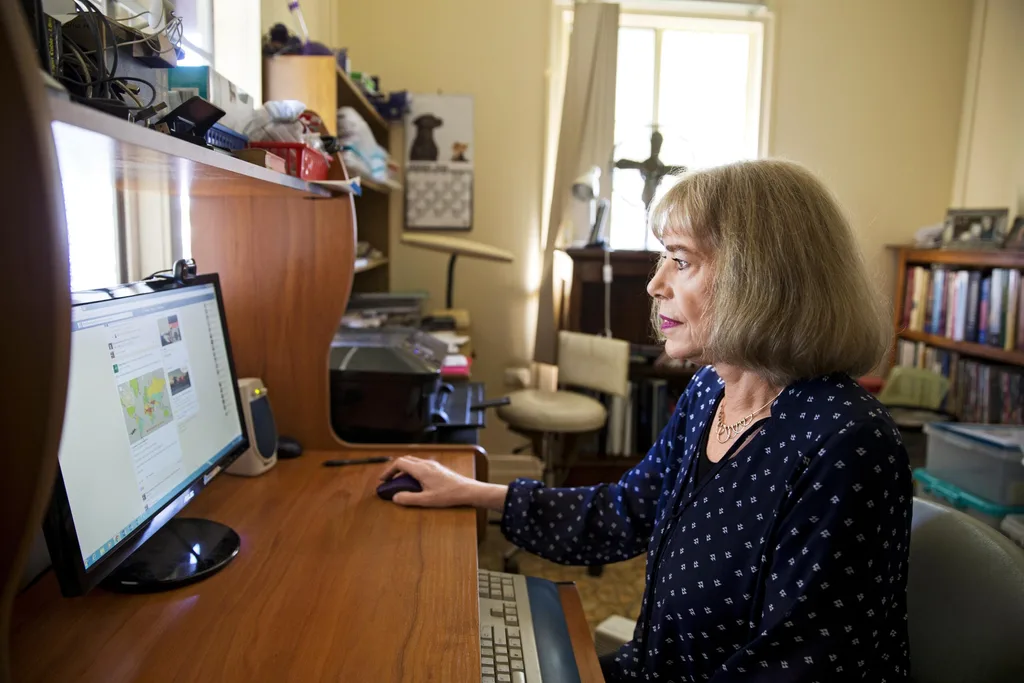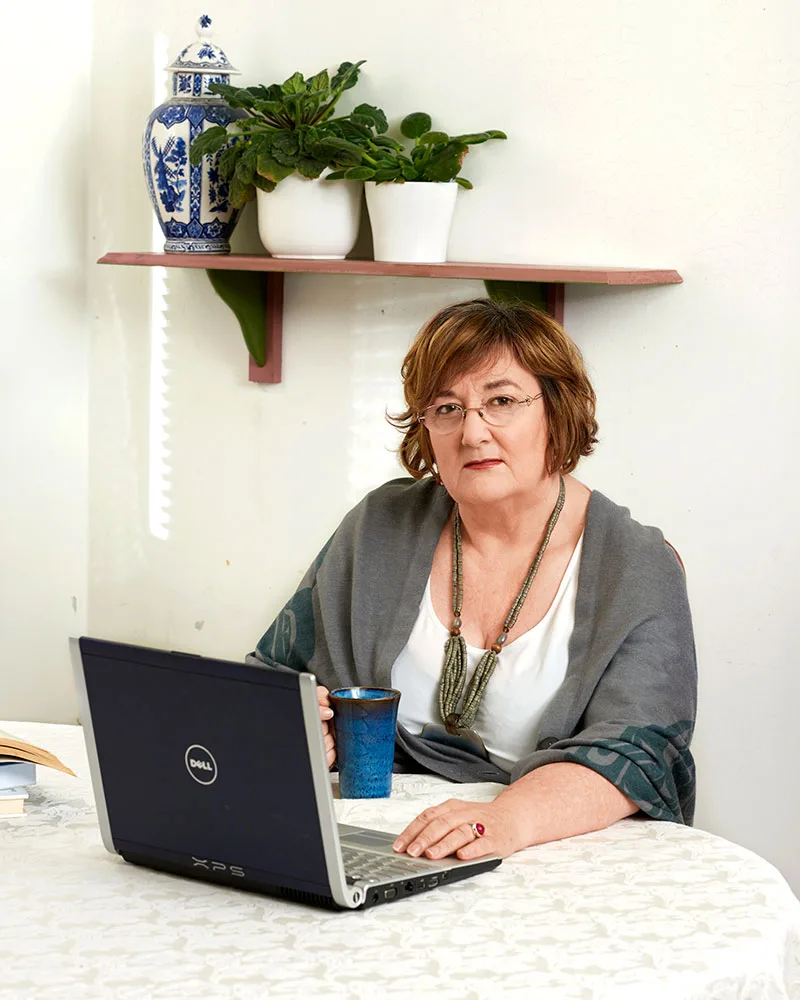Catch me if you can, my dear.” These were the last chilling words Patricia Meister heard from the man who had wanted to marry her. The attractive, well-spoken businessman she met on Facebook last November. She hadn’t been particularly looking for love, but had struck up a conversation. “I probably wasn’t in a great place in terms of past relationships,” she says.
Of Scottish and Italian heritage, he was based in Brisbane, but overseas on business. His wife had died eight years ago and he was looking for something deep and lasting. The more she talked to him, the more she found they had in common. They had the same values and wanted the same future. “He ticked all the boxes for me,” she says.
She found herself falling deliriously in love. She hadn’t expected to find something so wonderful in her early 60s. “It was a real high.” She couldn’t quite believe this lovely man had come into her life. They talked on the phone night and day in their own little bubble of excitement. “He showered me with beautiful music and poetry,” she says. “He had impeccable taste. He was incredibly polished.”
Patricia has a degree in biomedical science and another in social studies. She runs a successful high-end medical beauty business in Queensland. “I suppose I wanted a soul mate to share common interests,” she says. And now here he was coming home and on to a life with her. “He was always on his way home that week – that happened about six times.” When he got into trouble, of course, she helped the man she loved, she was investing in their future, she would get the money back.
What Patricia couldn’t know was that now that she was hooked, the fix was in. “It sort of becomes an addiction. Constantly releasing endorphins in your brain. The logical part of your brain stops functioning,” she says.
He got held up in Malaysia for bringing too much money into the country and he needed help for living expenses until he got it back. Then he was returning her money by diplomatic courier – with an exit fee of $25,000. Then another $25,000 for clearance into Australia. All documented with a courier website and tracking sheets.
“He took me on a fantasy journey,” Patricia says now. “You are so far in that you feel you have to keep paying to get your money back.” More and more money, more and more fake documentation. “It was incredibly complicated.” Then, in April this year, a phone call came to say he and his lawyer had been in a bad car accident and now there were medical bills. “My heart just dropped to my boots.
I thought, ‘Oh, my God, I have been scammed’.” It was, she says, like a death. “I was just left there, hanging off the cliff with no legs.”

“I thought, ‘Oh, my God, I have been scammed!'” Patricia Meister is $100,000 out of pocket after being the victim of a romance fraud. PHOTO: RUSSELL SHAKESPEARE
By the time she woke up from her dream of a happy ending, she had handed over $100,000. Not only was he not who he said he was, he didn’t even exist. That person was a fabrication. He was a criminal sitting in an internet cafe. He was, Patricia now believes, part of a highly skilled Nigerian syndicate operating out of Malaysia. “These people are well educated, they are literate, they are very articulate,” she says.
Kathryn Collins, a fraud prevention officer with the Queensland Police, agrees. “There is not just one person. There is a whole network of people working in the background and they won’t stop until they get your money.”
Last year, romance fraud took $55 million from innocent Australians who just wanted to be loved. Yet the majority of victims are too ashamed to report it, so the real figures may be significantly higher.
“There is no pirate with a patch over his eye,” the Acting Commissioner for Consumer Protection in Western Australia, David Hillyard, says. “It is very much a grooming exercise and victims are brought along gently and slowly.”
Another woman who was scammed, Elina Juusola, says the seduction phase “was very intense, incredible, like the best romance novel you have ever read, very sexy, which makes you high as a kite.” After all the disappointments life can deal, why not take a risk on love?
Because scammers operate outside Australian jurisdiction, there is nothing the police can do. They cannot be traced and are rarely caught. Once the money has left the country, it is impossible to get it back.
It is the perfect crime.
You might not know it when you are on social media, but scammers are everywhere. They are endemic. They come into your friend request box on Facebook. Nice-looking men with respectable jobs. They are nearly always widowers, guaranteed to elicit sympathy. They present as worldly, successful, financially secure.
“They can target you with different types of emails and different types of profiles,” says Elina, who has written a book, Love On The Line, to raise awareness of the issue and help victims move on. “An engineer from Texas who is a widower with one child, a military person who is in Afghanistan, or a civil engineer who is from Brisbane, but is working in Malaysia, businessmen who travel a lot, a doctor who wants to build a hospital in a Third World country – you will fall for one of them.”
Says Patricia Meister, “They infiltrate social media, dating sites and Skype. They are all fake.”
When you know what to look for, you will see the Facebook profile is new, there is no history of posts that would tell you all about them, the “person” doesn’t have many friends and only one or two photos. If you run the photo through Google Images, you may find that the image belongs to someone whose photo has been lifted from another site, their identity stolen. Yet victims don’t find this out until it is too late. We are built to give the benefit of the doubt. And we want so badly to believe in fate and destiny. The scammers prey on decent people, “who believe that other people also have integrity”, says Elina.
Dr Cassandra Cross, a Senior Lecturer at the Queensland University of Technology who has spent years researching online fraud, says she has spoken to victims “who in all other parts of their lives are successful. They are high-level public servants, managers, businesses operators, PhDs. Older people are attractive targets because they have access to superannuation, life savings, own their own homes. They are looking for that next stage of life. A lot of it is about loneliness.”
When we fall in love, we tend to confide in that person. In those heady early days, we open up, pour out our heart; we trust to love. We are a secret society of two. Love is the strongest drug there is and nobody thinks this could happen to them. The scammer will mirror your life story, making himself what you want him to be and listens for vulnerabilities to exploit. He gets into your life and your head. He will quickly move the victim off the public sites and isolate them into a private realm that becomes their reality.
Dr Cross recalls speaking to a scam victim who had confided in the offender about an illness. “It was not surprising when the offender’s mother had that same illness.”
Kathryn Collins of the Queensland Police gives an example of the way scammers typically operate. “If you say, ‘My dog needs walking’, you will find that they will have a dog of their own. Later on, their dog will get hit by a car and they can’t afford the vet fees. They know you love your dog and you’ll send money.”
Some scammers put children on the phone and the child will call the victim “Mum”. The scammers never let you see them because they are not the person in the photo they send.
“When I asked him to do Skype with me,” says Patricia, “he said the hotel has taken their webcam down because people are doing nude photos on it. But they can fake Skype as well. They can run a video loop through Skype.”
The scammers will phone late at night and early in the morning in a love bomb barrage until the person is so sleep-deprived that they don’t have a chance to think about anything else. It is something close to brainwashing.

Jan Marshall lost her $260,000 superannuation to a scammer. PHOTO: MARNIE HADDAD.
Jan Marshall was in her early 60s. Things were going well in her life. She had a good job in IT and had just moved from Brisbane to Melbourne. Looking for a companion to explore Victoria with, she went on the dating site PlentyOfFish. “I hadn’t done anything like that before,” she says. The most likely victims are people who are new to online dating, innocent and trusting. Jan was contacted by a British engineer working in the US who was intelligent, interesting and “sounded capable”. He was 52, with a 15-year-old daughter and divorced because he had caught his wife in bed with someone else.
“I said, ‘I am in Australia. Why did you contact me?’ And he said, ‘I will travel anywhere for the right person.’ In my naivety, I took that on face value.”
It was, she says, “a typical romance, where they start portraying interest and then love. During the initial emailing back and forth about what you think and like and don’t like, I thought, ‘Oh, here is somebody who is articulate’. He kept professing so much love that, eventually, I believed him. I came to believe this was the man of my dreams. He asked me to marry him and I said yes. They get you fully in love with them and once they have done that they can start asking for money.”
When he went to Dubai for work, he bought some oil, but a stop had been put on his bank account while it was assessed for money laundering. He sent screen shots of bank statements from the NatWest bank in England showing £5.4 million (A$9.3 million) and pictures of a house in Cheshire.
She now knows they were false.
“So I gave him quite a lot of money. I had the cash there and, of course, here is me thinking I want to do this out of love, I want to be in a partnership with somebody,” Jan says. “It was always with the expectation that it was a loan and I would get the money back. And it went on from there to numerous other small and large things.”
There are stories within stories in a scam. “They build up a scenario where it gets more and more scary,” she says. “He suffered violence [and] threats of violence. He was robbed. I often had suspicions, but I thought this can’t be a scam, it is too intimate and personal.”
It is difficult for victims to discern what is happening because they are blinded and it all happens so fast.
And then there was the inevitable car accident and the medical bills. “You get a call from a nurse or an administrator from the hospital and you have got to pay money,” says Jan. “You are listed as their next of kin because you are their fiancée.”
When there was no more money, she received her last text. “It said, ‘I love you so much and thanks for everything.’
I assumed that was for all my help in Dubai. It felt a bit dismissive to me, but you justify everything.”
Within a few days of not hearing from him, she realised it was a scam. Jan had parted with $260,000. That had been her superannuation.
Violated and humiliated, victims suffer shame. Jan was badly depressed and hid away for a year. Not only is there the catastrophic loss of money, but there is the double whammy of grief for the love that the victim has invested everything in. “They make you feel so special,” says Jan. “It is not that you can’t let go of them, but you cannot let go of the emotional impact of being made to feel special.”
Dr Cross says many victims are too ashamed to tell friends and family what has happened. Those who have children from a previous marriage often hadn’t told them they were dating online in the first place.
“There are so many people out there that are suffering in silence.
They lose their health, their friends, their family, their jobs, they can become suicidal,” she says.
So, at the time when they most need support, they can be ostracised by relatives who call them stupid and are angry that their inheritance is gone.
Dr Cross says she knows of one woman who ended up living in her car because her family wouldn’t help her.
“The word ‘scam’ belittles what has happened,” says Jan. “They have been targeted by criminal forces.”
When the money dries up, the scammers can become threatening. “Once you stop sending the money, the real pig will come out,” says Patricia Meister.
Some victims have shared intimate pictures or performed sex acts on webcams and can be blackmailed. Victims will be targeted again and again. “The offenders take their details and sell them or trade them amongst themselves. It is insidious and devastating,” says Dr Cross.
Jan was retrenched from her job and the Tax Office hit her with a bill for $70,000 for taking her super from a self-managed fund. Like so many victims who have worked for 30 or 40 years and lost everything, she is facing being one of the ageing poor and has had to start again at the age of 63. She has set up a support group and speaks publicly to warn others.

“It is a grooming exercise and victims are brought along gently and slowly.” PHOTO: GETTY.
Consumer Protection WA and the WA Police run Project Sunbird, which monitors money going to high-risk places and contacts potential scam victims. David Hillyard has this advice for anyone who may be tempted to get involved romantically online. “You have got to meet people face to face. No matter how many times there has been an airline strike or a passport has been stopped, unless you have met that person and verified who they are, and done your background checks on them, you must not send them money – no matter how tragic the story.”
Kathryn Collins runs a support group for scam victims at Police Headquarters in Brisbane. “We have people coming to the group that are just at their bottom, the lowest they could be. But we do see them recover.”
Everyone deserves to be loved and many people do find legitimate love online – just make sure the person is who they say they are. And anyway, says Dr Cross, “How do you target a prevention message against falling in love?”
If it sounds too good to be true, it probably is. Visit romancescam.com and male-scammers.com
A version of the article originally appeared in the December issue of The Australian Women’s Weekly.


